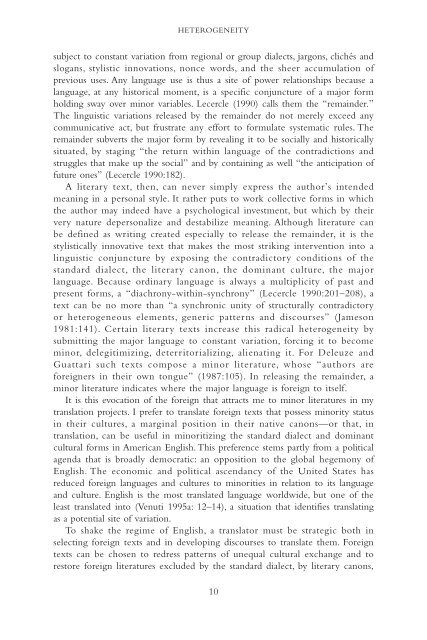THE SCANDALS OF TRANSLATION
9781134740642_sample_893345
9781134740642_sample_893345
Create successful ePaper yourself
Turn your PDF publications into a flip-book with our unique Google optimized e-Paper software.
HETEROGENEITYsubject to constant variation from regional or group dialects, jargons, clichés andslogans, stylistic innovations, nonce words, and the sheer accumulation ofprevious uses. Any language use is thus a site of power relationships because alanguage, at any historical moment, is a specific conjuncture of a major formholding sway over minor variables. Lecercle (1990) calls them the “remainder.”The linguistic variations released by the remainder do not merely exceed anycommunicative act, but frustrate any effort to formulate systematic rules. Theremainder subverts the major form by revealing it to be socially and historicallysituated, by staging “the return within language of the contradictions andstruggles that make up the social” and by containing as well “the anticipation offuture ones” (Lecercle 1990:182).A literary text, then, can never simply express the author’s intendedmeaning in a personal style. It rather puts to work collective forms in whichthe author may indeed have a psychological investment, but which by theirvery nature depersonalize and destabilize meaning. Although literature canbe defined as writing created especially to release the remainder, it is thestylistically innovative text that makes the most striking intervention into alinguistic conjuncture by exposing the contradictory conditions of thestandard dialect, the literary canon, the dominant culture, the majorlanguage. Because ordinary language is always a multiplicity of past andpresent forms, a “diachrony-within-synchrony” (Lecercle 1990:201–208), atext can be no more than “a synchronic unity of structurally contradictoryor heterogeneous elements, generic patterns and discourses” (Jameson1981:141). Certain literary texts increase this radical heterogeneity bysubmitting the major language to constant variation, forcing it to becomeminor, delegitimizing, deterritorializing, alienating it. For Deleuze andGuattari such texts compose a minor literature, whose “authors areforeigners in their own tongue” (1987:105). In releasing the remainder, aminor literature indicates where the major language is foreign to itself.It is this evocation of the foreign that attracts me to minor literatures in mytranslation projects. I prefer to translate foreign texts that possess minority statusin their cultures, a marginal position in their native canons—or that, intranslation, can be useful in minoritizing the standard dialect and dominantcultural forms in American English. This preference stems partly from a politicalagenda that is broadly democratic: an opposition to the global hegemony ofEnglish. The economic and political ascendancy of the United States hasreduced foreign languages and cultures to minorities in relation to its languageand culture. English is the most translated language worldwide, but one of theleast translated into (Venuti 1995a: 12–14), a situation that identifies translatingas a potential site of variation.To shake the regime of English, a translator must be strategic both inselecting foreign texts and in developing discourses to translate them. Foreigntexts can be chosen to redress patterns of unequal cultural exchange and torestore foreign literatures excluded by the standard dialect, by literary canons,10


